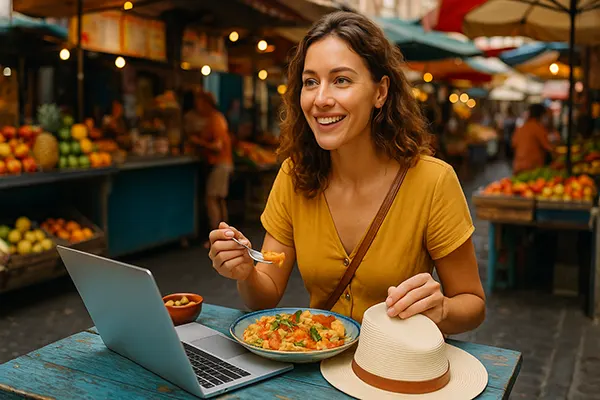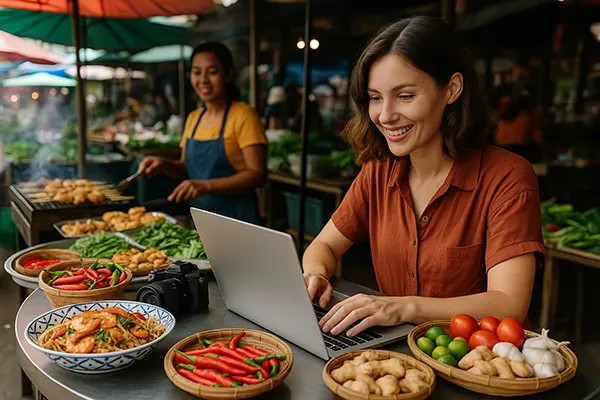
Gastronomic Tourism for Female Freelancers: A Journey Through Taste and Income
Gastronomic tourism has become a fascinating way for female freelancers to merge passion, work, and travel. In 2025, women from creative professions increasingly turn their journeys into sources of income by exploring local cuisines, attending culinary festivals, and sharing their authentic experiences with the world. This lifestyle offers freedom, cultural exchange, and the potential to build a sustainable business around food, storytelling, and digital creativity.
Monetising Culinary Journeys Abroad
For female freelancers, combining travel and gastronomy opens several income opportunities. Food photography, recipe blogging, YouTube vlogging, and paid collaborations with local restaurants or tourism boards have become common monetisation methods. Many digital nomads now sell online cooking courses or create e-books featuring their culinary discoveries, allowing them to earn even while travelling between countries.
In 2025, authenticity is the key to success. Readers value honest reviews, cultural insight, and a personal tone rather than polished advertising. Sharing real experiences — from attending a truffle festival in Italy to discovering street food in Bangkok — helps freelancers build trust and a loyal audience. Moreover, platforms like Patreon and Substack allow content creators to gain direct support from their followers.
Affiliate marketing related to kitchen tools, food tours, and local accommodation also contributes to revenue. Many freelancers form partnerships with culinary brands or travel agencies, turning their passion into a reliable source of income while maintaining independence and flexibility.
Examples of Successful Culinary Freelancers
Across the world, women have built strong careers through gastronomic travel. In Italy, chef and blogger Chiara Maci collaborates with regional tourism agencies, creating videos that celebrate traditional food culture. In Thailand, street food photographer Ploy Ratchanee uses social media to promote local dishes while partnering with ethical food companies. Meanwhile, British digital nomad Alice Corner documents sustainable gastronomy trends from Peru to Japan, offering her content through online masterclasses.
These women illustrate that culinary storytelling is not only art but also a business opportunity. Their journeys reflect the rise of female entrepreneurship within travel and food industries, especially in the digital space. Many combine freelance writing, photography, and social media management to diversify their income sources.
By focusing on niche markets such as vegan food, traditional cooking, or sustainable agriculture, freelancers can attract dedicated audiences and collaborate with eco-friendly brands. Their expertise builds credibility, transforming personal experience into professional recognition.
Top Destinations for Gastronomic Tourism in 2025
Several countries continue to stand out for their vibrant culinary cultures. Southern Italy remains a paradise for food enthusiasts — from homemade pasta in Puglia to the citrus flavours of Sicily. Female freelancers often choose this region for its warm climate, affordable living, and abundance of local festivals dedicated to olive oil, cheese, and wine.
Thailand offers another dimension of gastronomic travel. Cities like Chiang Mai and Bangkok are known for night markets where freelancers capture authentic recipes and interview street food vendors. Local cooking schools now welcome digital nomads, offering both workshops and co-working kitchens where creators can film content while tasting exotic dishes.
In Latin America, Peru leads the way thanks to its innovative fusion cuisine and support for sustainable gastronomy. Lima’s culinary scene combines ancient traditions with modern techniques, making it an ideal setting for freelancers looking to collaborate with restaurants or document the cultural significance of Peruvian food.
Seasonal Routes and Cultural Experiences
Planning a journey according to local food seasons brings deeper immersion into the destination’s culture. For example, freelancers can follow the grape harvest in Italy during autumn, explore mango season in Thailand in April, or attend cocoa festivals in Peru in July. These events offer opportunities to connect with local communities and gather unique content for blogs or social media.
Beyond tasting, many travellers now participate in workshops — from handmade pasta lessons to street food photography classes. These experiences enrich storytelling, providing both visual and emotional depth to content. By sharing behind-the-scenes moments, freelancers strengthen their connection with audiences seeking authenticity.
Additionally, collaborating with local chefs or guides helps ensure cultural accuracy. Interviewing women in the culinary industry — such as small business owners or traditional cooks — not only empowers local voices but also increases the credibility of the content under E-E-A-T principles.

Practical Tips for Working and Eating on the Road
Managing work-life balance while travelling for food can be challenging. Freelancers often rely on portable tools: lightweight laptops, power banks, and mobile Wi-Fi routers are essential for creating and publishing content. Maintaining a flexible routine ensures productivity without missing spontaneous culinary discoveries along the way.
Nutrition and well-being remain priorities. While exploring global cuisines, freelancers must find a balance between indulgence and health. Choosing local fruits, balanced meals, and staying hydrated prevents fatigue and supports sustainable travel habits. Many travellers integrate morning yoga or short walks between meals to stay energised during long working days.
Budget management is equally vital. Instead of dining at expensive venues daily, freelancers often collaborate with local eateries in exchange for reviews or social media promotion. This mutually beneficial approach reduces expenses and fosters genuine cultural exchange. Keeping transparent and ethical partnerships ensures the authenticity that readers value most.
Healthy Habits and Long-Term Sustainability
Maintaining mental and physical health is crucial for freelancers who work remotely while travelling. Regular sleep, proper nutrition, and digital detox periods help sustain creativity. In 2025, wellness-oriented gastronomy is gaining popularity — from organic farms in Spain to eco-lodges in Thailand that combine yoga with healthy cooking lessons.
Female freelancers also find empowerment in forming networks and communities. Through online forums or co-working retreats, they exchange knowledge about sustainable eating, remote work, and safety while travelling. This solidarity creates a supportive environment, encouraging more women to pursue independent gastronomic careers.
Ultimately, gastronomic tourism is not only about food — it’s about connection. Each meal tells a story of heritage, adaptation, and creativity. For freelancers, this story becomes both a professional opportunity and a personal journey through taste, culture, and self-expression.




